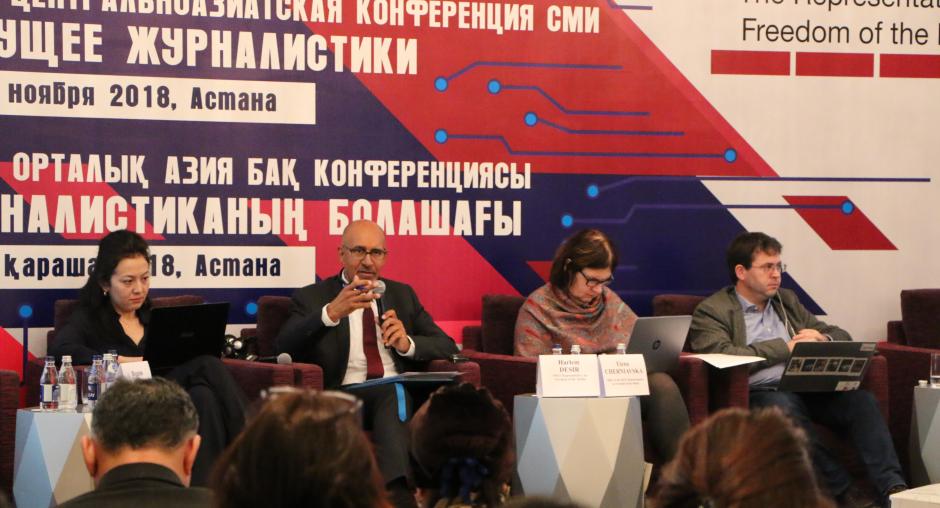20th Central Asia Media Conference concludes in Astana, OSCE Representative calls for pluralistic and free media landscape

ASTANA, 8 November 2018 – The 20th Central Asia Media Conference for media representatives and experts from Kazakhstan, Kyrgyzstan, Tajikistan, Turkmenistan, Uzbekistan and Mongolia, organized by the OSCE Representative on Freedom of the Media, Harlem Désir, concludes today in Astana.
The two-day conference was opened by Representative Désir, the Minister of Information and Communication of Kazakhstan, Dauren Abayev, and the Head of the OSCE Programme Office in Astana, Gyorgy Szabó.
“I am pleased that such a representative group of experts across Central Asia and Mongolia met here in Astana to review the media freedom situation in the region,” said Désir. “High interest in the event among media professionals and media rights advocates shows that this platform for exchange of opinions remains vital for the media community as much now as it was twenty years ago when we just started.”
Désir said that too often in the region, journalists work under pressure and fear; lacking access to information, especially public information which could be provided by the authorities.
“Journalists are afraid to report on sensitive political issues, on corruption cases, on dissenting views. And when they do so, they face problems in front of tribunals,” he said. “In different cases, we have seen charges brought against journalists for economic crimes, fraud or extortion. Unfortunately, there are still several bloggers imprisoned. This has led to a high level of self-censorship.”
“Today, it is time to not only reaffirm the commitments on media freedom. It is time to turn them into the living reality of a pluralistic and free media landscape. No journalists should be prosecuted, no media shut down for doing their work,” said Désir
During the two-day conference, journalists, media workers, representatives from NGOs and inter-governmental organizations, together with international experts and state representatives discussed a broad range of issues related to media freedom and the future of journalism in Central Asia, particularly access to the Internet, the quality of information in the age of digital transformation, “fake news”, the spread of disinformation, and the role of media in the development of the countries of the region.
Participants had a chance to participate in side events and group discussions, focusing on topics such as user-generated content, fact-checking tools, concerns regarding regulation and self-regulation, as well as online freedom of expression and hate speech.
The conference participants discussed recommendations of the OSCE Representative on Freedom of the Media addressing media freedom in the region, regulation of content, including harmful content, self-regulation and media literacy. The recommendations will be conveyed to the governments of all Central Asian states and to the media community.
On the occasion of the conference, the Representative also met with Kazakhstan’s Foreign Affairs Minister, Kairat Abdrakhmanov, and with the Information and Communications Minister, Dauren Abayev. They discussed the negative impact of certain provisions of the criminal code on the media and freedom of expression in the country, the need to have a more transparent system to distribute state subventions to the press, the benefits of greater access to public information, as well as some ongoing media cases.
The OSCE Representative on Freedom of the Media observes media developments in all 57 OSCE participating States. He provides early warning on violations of freedom of expression and media freedom and promotes full compliance with OSCE media freedom commitments. Learn more at www.osce.org/fom, Twitter: @OSCE_RFoM and on www.facebook.com/osce.rfom.
